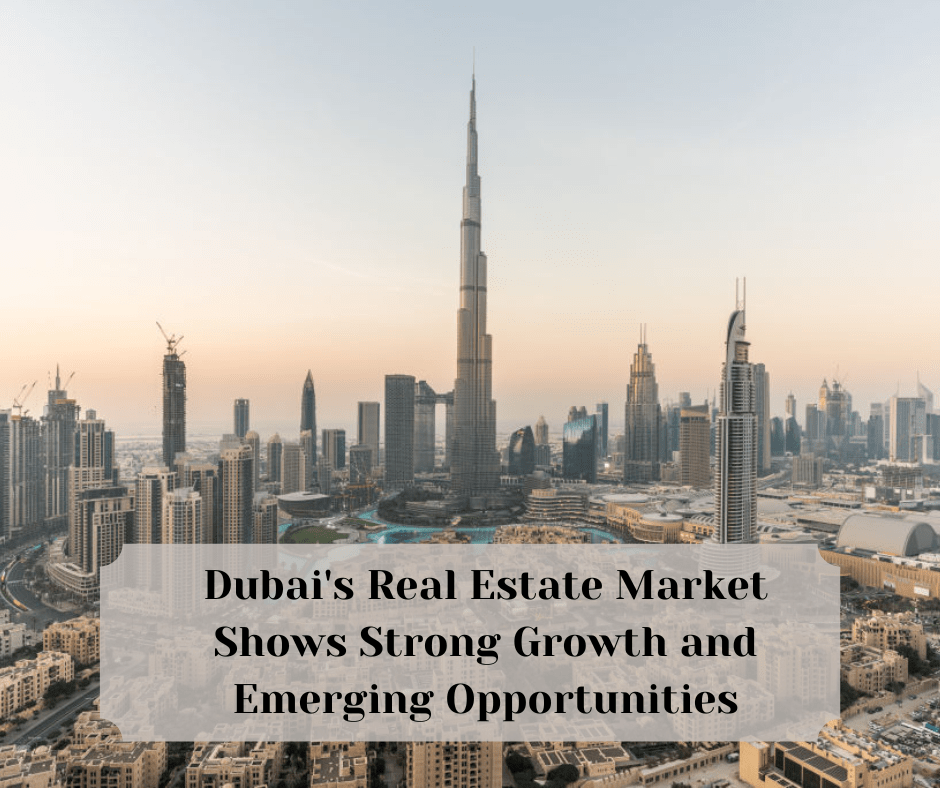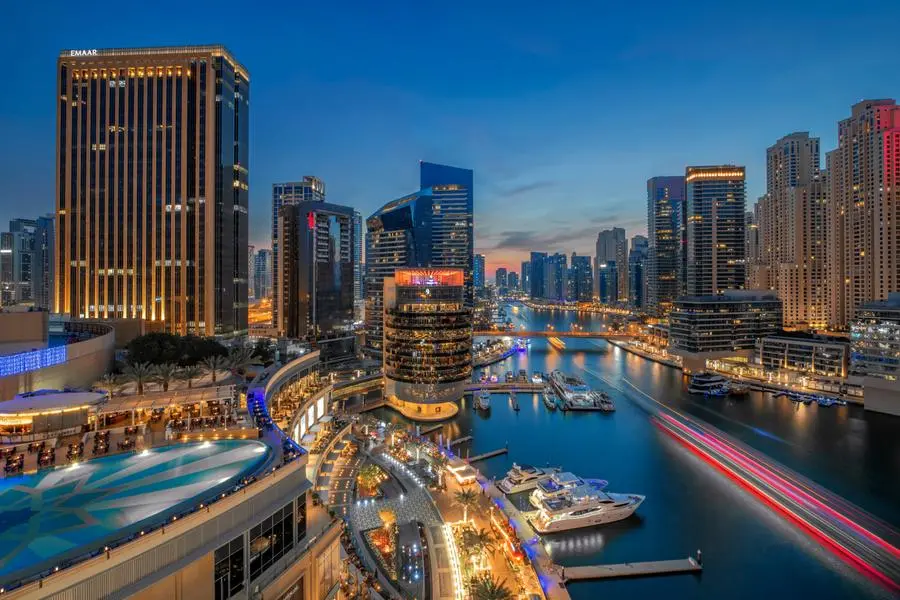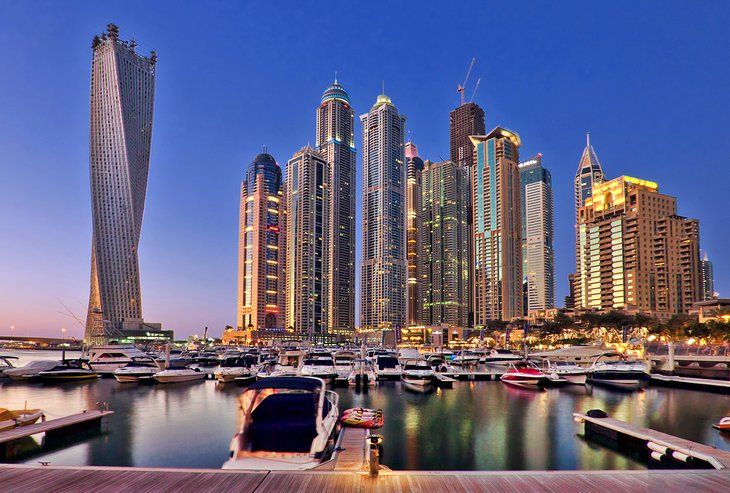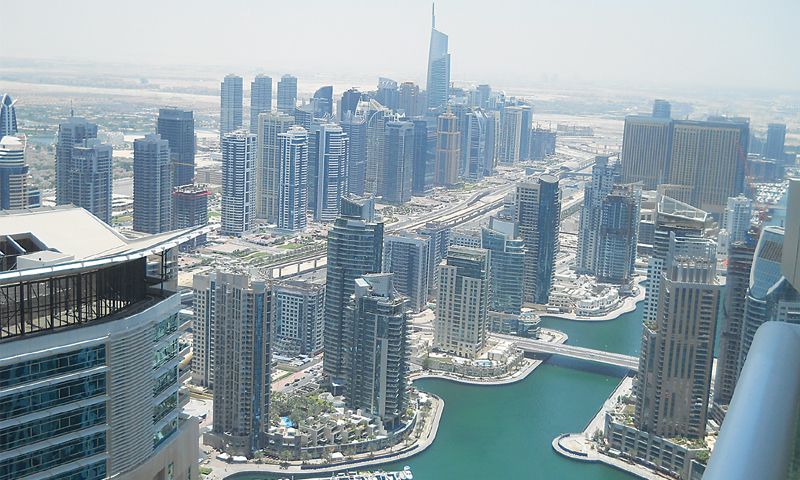
Dubai’s Real Estate Market Shows Strong Growth and Emerging Opportunities

Dubai’s Real Estate Market Experiencing Rapid Growth and New Opportunities
Dubai’s real estate market has displayed remarkable growth and emerging opportunities in Q2 2023. The residential sector witnessed a substantial upsurge in both sales volume and value, with over 30,000 property transactions totaling more than AED 91 billion. This exceptional performance in Q2 signifies a 35% surge in transactions and a 54% increase in sales value compared to Q2 2022.
Notably, the demand for apartments surged, leading to a record-high median price per square foot of AED 1,336 for Q2. Off-plan villas also experienced a rapid price escalation, growing by 32% compared to Q2 2022. This was largely attributed to heightened interest in luxury villa communities and appealing post-handover payment plans offered by developers.

The demand for affordable properties has driven growth in emerging areas. Dubai Marina emerged as the top-selling location for ready properties, while Jumeirah Village Circle led in off-plan sales. Damac Lagoons took the lead in off-plan villa sales, boasting 642 transactions valued at AED 1.8 billion.
The prime real estate market in Dubai is flourishing, solidifying its position as a luxury destination on par with established global markets. In-demand areas such as The Palm Jumeirah, Emirates Hills, and Jumeirah Bay Island are attracting significant interest from ultra-high-net-worth individuals (UHNWI), establishing Dubai as a premier choice for second homes. Despite its luxurious status, Dubai maintains its affordability, with average transacted prices of around AED 3,360 per square foot.
The ultra-prime segment of Dubai’s real estate market is also thriving. Record-breaking transactions include the sale of apartments in Bulgari Lighthouse, Island 2, for AED 137 million, and a villa in Emirate Living for AED 150 million.

Dubai’s luxury residential market has cemented its global standing, ranking as the fourth most active luxury market in 2022. With US$1 million, buyers can secure approximately 1,130 square feet of prime residential space in Dubai, a considerably larger area compared to other major cities like London, New York, or Singapore. This affordability, combined with Dubai’s exceptional real estate offerings, has fueled demand among affluent individuals.
While the prime real estate market has seen significant growth, new project launches have been limited, resulting in a supply-demand imbalance and substantial price appreciation. However, the landscape is gradually shifting, with new apartment launches on the rise, particularly in prime submarkets like Palm Jumeirah. The near future anticipates the delivery of 289 homes by 2025, with 54% of them being villas. Notable projects, such as Alpago’s Palm Flower, Ellington Beach House, Bvlgari Mansions, and Sur La Mer, are contributing to the upcoming market inventory.
Dubai’s prime residential market outlook remains optimistic, attributed to its safe-haven status, the influx of diverse international UHNWI, and the effective governmental response to the pandemic. Despite potential risks tied to global economic conditions, Dubai’s reputation as a safe haven bolsters its attractiveness, particularly during uncertain times. Soliman Hossameldin, Marketing Manager of Property Shop Investment, underscores the confidence prevailing in the market due to its consistent and sustainable growth trajectory, as evidenced by its record-breaking performance in Q2 2023.

As Dubai’s real estate market continues to display resilience and growth, it’s important to recognize the factors that have contributed to this remarkable trajectory. The city’s safe-haven status, coupled with its strategic location as a hub for business, trade, and tourism, has attracted a diverse range of international investors and ultra-high-net-worth individuals. The government’s effective handling of the pandemic has further solidified Dubai’s reputation as a reliable and secure destination for real estate investment.
The appeal of Dubai’s real estate market extends beyond its domestic borders. International investors are drawn to its dynamic business environment, world-class infrastructure, and luxurious lifestyle offerings. Additionally, Dubai’s tax-free policies and regulations that facilitate foreign ownership of property have created an investor-friendly ecosystem that supports continued growth in the real estate sector.
The limited supply of new projects in the prime market has played a crucial role in driving up property prices. This supply-demand imbalance, while presenting challenges for affordability, has also contributed to positioning Dubai as a top-tier global luxury market. The recent uptick in new apartment launches, especially in prestigious areas like Palm Jumeirah, signals a positive shift toward addressing this supply gap.
As Dubai’s real estate market evolves, stakeholders, including developers, investors, and regulatory bodies, must collaborate to ensure sustainable growth and stability. Responsible urban planning, infrastructure development, and balanced supply and demand dynamics will be instrumental in maintaining the attractiveness of Dubai’s real estate offerings.
Trends And Factors

Looking ahead, Dubai’s real estate market is poised for further growth and evolution. Several trends and factors are expected to shape the landscape of Dubai’s real estate market in the coming years:
Sustainable Development: As global consciousness around environmental sustainability grows, Dubai’s real estate market is likely to witness an increased focus on eco-friendly and sustainable development. This could include the integration of green technologies, energy-efficient designs, and environmentally conscious urban planning.
Technology Integration: The integration of technology into the real estate sector is inevitable. Dubai’s market is likely to see advancements such as smart homes, blockchain-based property transactions, virtual reality property tours, and more. These technological innovations can enhance customer experience, streamline processes, and attract tech-savvy investors.
Mixed-Use Developments: The concept of mixed-use developments, which combine residential, commercial, and recreational spaces in one area, is gaining momentum. Such developments offer convenience and a holistic lifestyle, and Dubai’s market is likely to see more of these integrated projects.
Affordability Measures: While Dubai is known for luxury offerings, there’s a growing recognition of the need to cater to a wider range of income brackets. Affordable housing initiatives and flexible payment plans can make real estate accessible to a larger demographic, fostering inclusivity and growth.
Regulatory Enhancements: Dubai’s government has shown a proactive approach to regulatory improvements that enhance investor confidence and market transparency. Continued efforts in this direction, including updated property laws and regulations, will further establish Dubai as a secure and attractive investment destination.
Tourism and Events: Dubai’s status as a global tourist and events hub significantly influences its real estate market. As the city continues to host major events, exhibitions, and international conferences, the demand for short-term rentals and luxury accommodations is expected to remain strong.
Diversification of Demand: While ultra-high-net-worth individuals remain a key demographic, the market is likely to witness increasing interest from a broader range of international investors, including those seeking investment properties, vacation homes, and rental income.
Infrastructure Expansion: Dubai’s commitment to infrastructure development remains unwavering. The ongoing expansion of transportation networks, including the metro and road systems, enhances accessibility and convenience for residents and investors alike.
Global Economic Dynamics: Dubai’s real estate market is not isolated from global economic trends. Fluctuations in global markets, interest rates, and geopolitical events can impact investor sentiment and property demand. Adapting to these external influences will be crucial for maintaining stability.
In conclusion, Dubai’s real estate market has showcased robust growth and emerging opportunities in recent times, driven by factors such as increased demand for affordable properties, strong performance in prime and ultra-prime segments, and the city’s reputation as a safe haven. While challenges like supply-demand imbalances exist, Dubai’s proactive approach to economic diversification and ongoing investment in infrastructure set a promising trajectory for the future. As the market continues to flourish, collaboration and strategic planning will be key to ensuring that Dubai remains a top destination for global real estate investment.